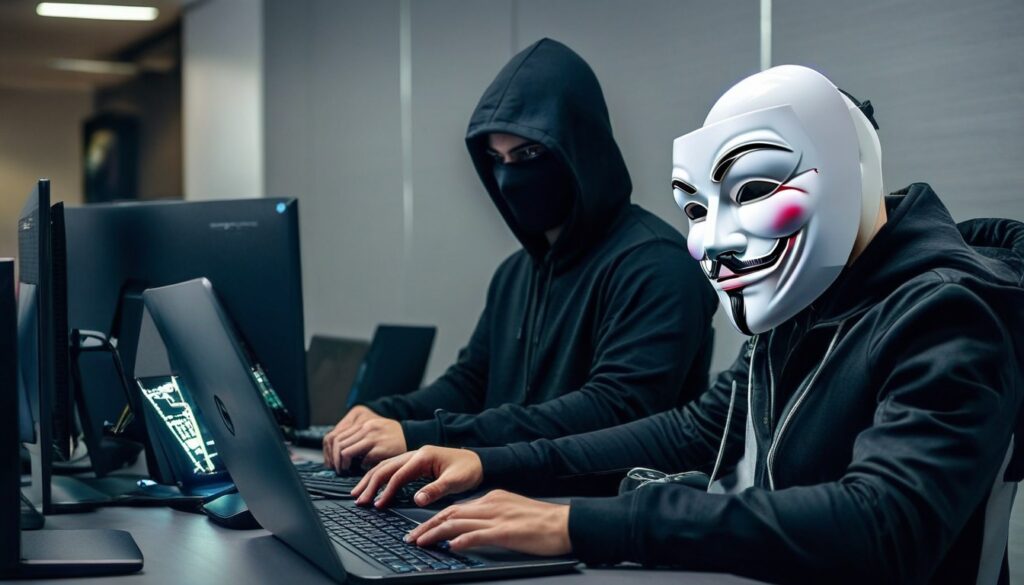In the labyrinth of cyberspace, a shadowy and elusive collective known as Anonymous has left an indelible mark on the digital landscape. Cloaked in anonymity and symbolized by the iconic Guy Fawkes mask, Anonymous has captured the public’s imagination as a group of hacktivists with a penchant for challenging authority and exposing corruption. In this exploration, we delve into the origins, motives, and controversies surrounding the enigmatic Anonymous hackers group.

Origins and Evolution
Anonymous emerged from the depths of the internet forums, notably the anarchic realm of 4chan, around the mid-2000s. The moniker “Anonymous” itself reflects the group’s early ethos of posting and acting without any persistent identity. Initially, their activities were centered around internet pranks, memes, and trolling. However, as the group grew in size and influence, it underwent a profound evolution, transforming from a loose collective of online jesters to a formidable force engaging in cyberactivism.
The Guy Fawkes Mask: Symbol of Dissent
At the heart of Anonymous’s visual identity lies the Guy Fawkes mask, popularized by Alan Moore’s graphic novel “V for Vendetta” and later adapted into a symbol of dissent and resistance. The mask serves a dual purpose for the hacktivist collective: it provides a uniform and recognizable image for protesters at physical gatherings while preserving the anonymity of those involved. This symbolism has become synonymous with the group’s commitment to fighting against perceived injustices.
Hacktivism: The Weapon of Choice
Anonymous distinguishes itself through its unique brand of activism, known as hacktivism. Unlike traditional forms of protest, hacktivism leverages digital tools and hacking techniques to draw attention to social and political issues. The group has employed tactics such as Distributed Denial of Service (DDoS) attacks, which flood target websites with traffic, rendering them temporarily inaccessible. This arsenal of digital weaponry has been deployed against entities deemed oppressive or corrupt by Anonymous.
Project Chanology: A Watershed Moment
A turning point in the group’s evolution was Project Chanology in 2008, a protest against the Church of Scientology. Anonymous accused the church of censorship and abusive practices, leading to a series of online and offline actions against Scientology. This marked the shift from internet pranks to politically motivated activities, setting the stage for Anonymous to become a catalyst for change on a global scale.
The Ethical Quandary
Anonymous’s actions have sparked a fierce debate about the ethics of hacktivism. While supporters laud the group for exposing corruption and championing human rights, critics argue that their methods, such as unauthorized access to digital systems and the disruption of online services, are tantamount to cyber vigilantism. The lack of a centralized structure within Anonymous has also led to instances where rogue actors claim affiliation, conducting activities that may not align with the collective’s original intentions.
Confrontations with Governments
Anonymous has engaged in high-profile conflicts with governments worldwide, using their hacking prowess to target institutions and individuals associated with perceived injustices. Notably, the group has clashed with authoritarian regimes, including taking on the Russian government over allegations of election fraud and censorship. These cyber skirmishes raise complex questions about the role of hacktivism in geopolitical conflicts and the potential repercussions of such actions.
Legacy and Current Status
While the frequency of Anonymous’s activities has diminished in recent years, the collective’s legacy remains deeply ingrained in discussions surrounding online activism, digital rights, and the power dynamics of the internet. The decentralized nature of the group makes it challenging to ascertain its current status accurately, leaving many to ponder whether Anonymous continues to operate in the shadows or has taken a back seat in the ever-evolving landscape of digital dissent.
Conclusion
Anonymous, the faceless and dynamic collective of hacktivists, continues to captivate the world’s imagination. From its humble origins on 4chan to challenging governments and institutions on a global scale, the group’s journey reflects the evolving nature of online activism. As we navigate the intricate web woven by Anonymous, it is essential to grapple with the ethical dilemmas posed by hacktivism and to consider the enduring impact of this enigmatic group on the intersection of technology, power, and the pursuit of justice in the digital age.
Huge fan of Anonymous and anons i love hacking but i don’t know where to start it how ? Too much questions in my mind can you please help me in this